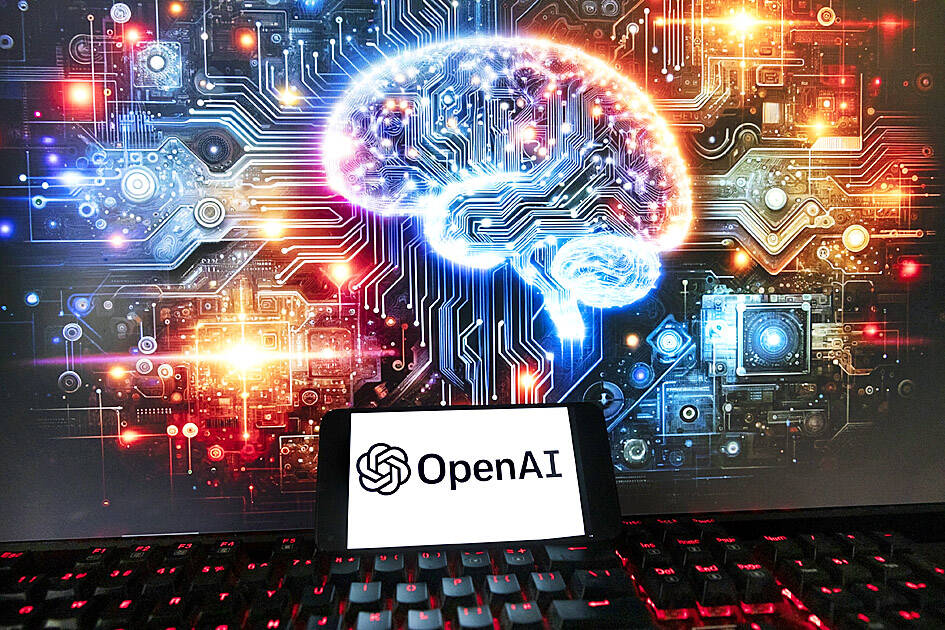The European Union yesterday announced the creation of an "AI Office" of tech experts, lawyers and economists to regulate artificial intelligence (AI) under a sweeping new law.
The EU this year approved the world’s first comprehensive rules to govern AI, especially powerful systems like OpenAI’s ChatGPT after long, intense negotiations.
First proposed in 2021, the bloc raced to get the law in the books after ChatGPT burst onto the scene in 2022, leaving users stunned by its ability to churn out coherent text including poems within seconds.

Photo: AP
"The AI Office aims at enabling the future development, deployment and use of AI in a way that fosters societal and economic benefits and innovation, while mitigating risks," the European Commission said.
The 140-member AI Office will be established within the commission, which is the EU’s executive arm and also acts as the bloc’s powerful tech regulator.
"The Office will foster a European AI ecosystem that is innovative, competitive and respectful of EU rules and values," EU Commissioner for Internal Market and Defense Industry Thierry Breton said.
The EU’s law known as the "AI Act" has tougher rules for general-purpose AI systems such as ChatGPT and takes a risk-based approach to the technology.
The higher the risk to Europeans’ rights or health, for example, the greater the systems’ obligations to protect individuals from harms.
"Together with developers and a scientific community, the office will evaluate and test general purpose AI to ensure that AI serves us as humans and upholds our European values," EU Commissioner for Competition Margrethe Vestager said.
Companies will have to comply with the EU’s law by 2026, but rules covering AI models like ChatGPT will apply 12 months after the law becomes official.
The EU’s announcement came on the same day that EU auditors criticized the commission for failing to sufficiently invest in AI to achieve the bloc’s ambitions.
"Going forward, stronger governance and more — and better targeted — public and private investment in the EU will be paramount if the EU is to achieve its AI ambitions," the bloc’s spending watchdog said.
But the commission defended the bloc’s record and said it was investing more than one billion euros (US$1.1 billion) annually in AI research projects under different schemes.

TAKING STOCK: A Taiwanese cookware firm in Vietnam urged customers to assess inventory or place orders early so shipments can reach the US while tariffs are paused Taiwanese businesses in Vietnam are exploring alternatives after the White House imposed a 46 percent import duty on Vietnamese goods, following US President Donald Trump’s announcement of “reciprocal” tariffs on the US’ trading partners. Lo Shih-liang (羅世良), chairman of Brico Industry Co (裕茂工業), a Taiwanese company that manufactures cast iron cookware and stove components in Vietnam, said that more than 40 percent of his business was tied to the US market, describing the constant US policy shifts as an emotional roller coaster. “I work during the day and stay up all night watching the news. I’ve been following US news until 3am

UNCERTAINTY: Innolux activated a stringent supply chain management mechanism, as it did during the COVID-19 pandemic, to ensure optimal inventory levels for customers Flat-panel display makers AUO Corp (友達) and Innolux Corp (群創) yesterday said that about 12 to 20 percent of their display business is at risk of potential US tariffs and that they would relocate production or shipment destinations to mitigate the levies’ effects. US tariffs would have a direct impact of US$200 million on AUO’s revenue, company chairman Paul Peng (彭雙浪) told reporters on the sidelines of the Touch Taiwan trade show in Taipei yesterday. That would make up about 12 percent of the company’s overall revenue. To cope with the tariff uncertainty, AUO plans to allocate its production to manufacturing facilities in

Six years ago, LVMH’s billionaire CEO Bernard Arnault and US President Donald Trump cut the blue ribbon on a factory in rural Texas that would make designer handbags for Louis Vuitton, one of the world’s best-known luxury brands. However, since the high-profile opening, the factory has faced a host of problems limiting production, 11 former Louis Vuitton employees said. The site has consistently ranked among the worst-performing for Louis Vuitton globally, “significantly” underperforming other facilities, said three former Louis Vuitton workers and a senior industry source, who cited internal rankings shared with staff. The plant’s problems — which have not

COLLABORATION: Given Taiwan’s key position in global supply chains, the US firm is discussing strategies with local partners and clients to deal with global uncertainties Advanced Micro Devices Inc (AMD) yesterday said it is meeting with local ecosystem partners, including Taiwan Semiconductor Manufacturing Co (TSMC, 台積電), to discuss strategies, including long-term manufacturing, to navigate uncertainties such as US tariffs, as Taiwan occupies an important position in global supply chains. AMD chief executive officer Lisa Su (蘇姿丰) told reporters that Taiwan is an important part of the chip designer’s ecosystem and she is discussing with partners and customers in Taiwan to forge strong collaborations on different areas during this critical period. AMD has just become the first artificial-intelligence (AI) server chip customer of TSMC to utilize its advanced